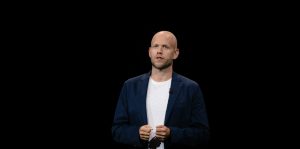
After more than 40 years of operation, DTVE is closing its doors and our website will no longer be updated daily. Thank you for all of your support.
Spotify outlines ‘audio-first’ strategy, buys Gimlet and Anchor
Spotify CEO Daniel Ek has said that the future of the streaming service is audio, not just music, as the company announced the acquisition of two podcasting companies, Gimlet Media and Anchor.

Daniel Ek
Outlining his overall vision for the company, Ek said that he wants to bring radio listening to Spotify and deepen engagement with users. “This opportunity starts with the next phase of growth in audio – podcasting.”
“Consumers spend roughly the same amount of time on video as they do on audio,” said Ek. “Video is about a trillion-dollar market and the music and radio industry is worth around a hundred billion dollars. I always come back to the same question: are our eyes really worth 10 times more than our ears? I firmly believe this is not the case.”
The comments came as Spotify announced it has acquired independent podcast producer Gimlet Media and podcast creation and publishing service Anchor. The deals, which were agreed for undisclosed terms, are expected to close this quarter.
Anchor, which allows users to record and upload podcasts to a range of platforms – including Apple Podcasts and Google Podcasts – said via social media that the acquisition will not change how users create, host, distribute, and monetise their podcasts with Anchor.
Reply All, one of Gimlet Media’s podcasts, also took to Twitter to assure listeners that “nothing is changing about our distribution,” claiming that the show will remain on Apple Podcasts.
However, from a strategic standpoint, Ek did point out the benefits of having “unique programming” on Spotify, stating that it prompts people who previously thought Spotify was not right for them to give it a try.
Referring to the acquisitions specifically, Ek said: “These companies are best-in-class and together we will offer differentiated and original content. Gimlet and Anchor will position us to become the leading platform for podcast creators around the world and the leading producer of podcasts.”
He added: “As we expand deeper into audio, especially with original content, we will scale our entire business, creating leverage in the model through subscriptions and ads. This is why we feel it is prudent to invest now to capture the opportunity ahead.”
Spotify claims to be the second-largest podcasting platform and Ek said that the company’s podcast users spend almost twice the time on the platform and more time listening to music.
Spotify’s renewed focus on the audio space follows previous experimentation in video, with the music streaming company agreeing deals with companies like Disney/ABC, NBCUniversal and Viacom back in 2015 to package clips and full episodes of television programming. A year later it also launched a 12-strong slate of original programmes, focused on music and pop culture.
Last year Spotify appointed Condé Nast’s president of entertainment, Dawn Ostroff, as its chief content officer to oversee partnerships across music, audio and video. It then hired Condé Nast Entertainment’s acting president, Sahar Elhabashi, as VP of content business some five months later.
Read Ek’s full ‘Audio-First’ post on Spotify’s For the Record news section by clicking here.

